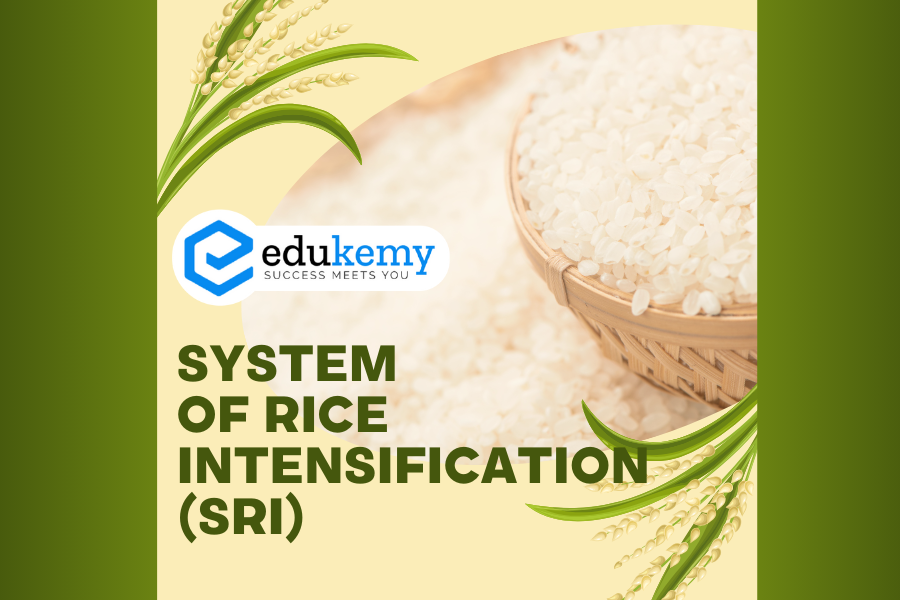
The System of Rice Intensification (SRI) is an innovative method of cultivating rice that emphasizes the use of organic manure, young seedlings planted in a single row with wider spacing, and intermittent irrigation. Unlike traditional rice cultivation methods that involve continuous flooding, SRI promotes a more controlled and resource-efficient approach.
Key features of the SRI method include:
- Abundant Organic Manure: SRI encourages the use of organic manure to enhance soil fertility.
- Single Row Planting: Young rice seedlings are planted in a single row with wider spacing, promoting healthy root growth.
- Intermittent Irrigation: Instead of continuous flooding, SRI involves periodic irrigation to maintain soil moisture. The frequency of irrigation varies based on soil texture.
- Weeding and Aeration: The use of a weeder not only controls weeds but also aerates the soil, facilitating root growth and supporting beneficial soil organisms.
SRI is considered a comprehensive farm management and conservation strategy, combining various practices to optimize land, seeds, water, nutrients, and labor for increased productivity. Proponents of SRI claim that it can lead to higher yields, water savings, reduced production costs, and increased income for farmers. The method has been implemented and shown positive results in multiple countries, offering environmental and equity benefits.
It’s important to note that the success of agricultural practices such as SRI may vary based on local conditions, crop varieties, and other factors. Farmers are often encouraged to adopt practices that suit their specific agro-ecological context.
FAQs
Q: What is the System of Rice Intensification (SRI)?
The System of Rice Intensification (SRI) is an innovative methodology for cultivating rice that aims to maximize yields while minimizing inputs such as water, seeds, and chemical fertilizers. It emphasizes principles such as transplanting young seedlings, wider spacing, soil aeration, and organic nutrient management.
Q: How does SRI differ from traditional rice cultivation methods?
SRI differs from traditional rice cultivation in several ways. Unlike conventional methods that often rely heavily on chemical inputs and flooding fields, SRI encourages practices like single-seedling transplanting, intermittent irrigation, and soil aeration to promote healthier root development and better nutrient uptake. It emphasizes the importance of soil health and natural processes over reliance on external inputs.
Q: What are the benefits of adopting SRI?
Adopting SRI can lead to various benefits for farmers and the environment. These include increased yields, reduced water usage (by up to 50%), decreased dependence on chemical fertilizers and pesticides, improved soil health, and greater resilience to climate change. Additionally, SRI practices are often more labor-intensive but can result in higher incomes for farmers due to improved yields and reduced input costs.
Q: Is SRI suitable for all types of rice cultivation?
While SRI principles can be adapted to different agroecological conditions, the suitability of SRI depends on various factors such as soil type, water availability, and farmers’ willingness to adopt new practices. SRI has been successfully implemented in a range of environments, from rainfed uplands to irrigated lowlands, but its effectiveness may vary depending on local conditions and farmers’ capacity to implement the techniques.
Q: Are there any challenges associated with adopting SRI?
Despite its potential benefits, adopting SRI may pose challenges for farmers, including the need for initial training and capacity-building, labor-intensive practices, and potential resistance to change from traditional methods. Additionally, successful implementation of SRI requires careful attention to soil and water management, which may require additional investment in infrastructure and resources. However, with proper support and training, many farmers have found SRI to be a sustainable and profitable alternative to conventional rice cultivation methods.
In case you still have your doubts, contact us on 9811333901.
For UPSC Prelims Resources, Click here
For Daily Updates and Study Material:
Join our Telegram Channel – Edukemy for IAS
- 1. Learn through Videos – here
- 2. Be Exam Ready by Practicing Daily MCQs – here
- 3. Daily Newsletter – Get all your Current Affairs Covered – here
- 4. Mains Answer Writing Practice – here

